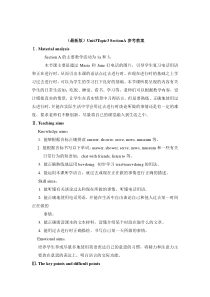 DOC
DOC
【文档说明】Unit 3 Topic 3《what were you doing at these times yesterday》(SectionA)教案-八年级上册英语【仁爱版】.doc,共(9)页,51.500 KB,由小喜鸽上传
转载请保留链接:https://www.ichengzhen.cn/view-104257.html
以下为本文档部分文字说明:
(最新版)Unit3Topic3SectionA参考教案Ⅰ.MaterialanalysisSectionA的主要教学活动为1a和3。本节课主要是通过Maria和Jane打电话的图片,引导学生复习电话用语和正在进行时,从而引出
本课的语法点过去进行时。在现在进行时的基础之上学习过去进行时,可以为学生的学习打下良好的基础。本节课所要呈现的内容有关学生的日常生活如:吃饭、睡觉、看书、学习等。老师们可以根据教学内容,设计模拟真实的情景,让学生在真实
情景中习得语言。但是要熟练、正确地使用过去进行时,并能在实际生活中学会用过去进行时谈论所做的事情还是有一定的难度,要求老师们不断创新,尽量将自己的课堂融入到生活之中。Ⅱ.TeachingaimsKnowledgeaims:1.能够根据音标正确拼读an
swer,shower,serve,news,museum等。2.能根据音标书写以下单词:answer,shower,serve,news,museum和一些有关日常行为的短语如:chatwithfriends,listento等。3.能正确熟练地运用be+doing,
初步学习was/were+doing的用法。4.能运用本课所学语言,就过去或现在正在做的事情进行正确的描述。Skillaims:1.能听懂有关谈论过去和现在所做的事情,听懂电话用语。2.能正确地使用电话用语,并能在生活中自由谈论自己和他人过去某一时间正在做的事情。3.能正确
朗读课本的文本材料,读懂介绍某个时段在做什么的文章。4.能用过去进行时正确描绘、书写自己某一天所做的事情。Emotionalaims:培养学生养成尽量多地使用英语表达自己的意思的习惯,将精力和注意力主要
放在意思的表达上,明白语言的交际功能。Ⅲ.ThekeypointsanddifficultpointsKeypoints:1.熟练使用电话用语。2.学习过去进行时。3.学习有关活动的短语。如:chatonline,visitamuseum,listentothenewsDifficultpo
ints:学习有关活动的短语如,chatonline,visitamuseum,listentothenews并能够将这些短语正确应用于过去进行时之中。Ⅳ.Learningstrategies1.上课之前多预习跟活动有关的短语能帮助你熟练was/were
+doing的结构。2.读文章之前先看看图片提示能让你更好的了解文章的内容。Ⅴ.TeachingaidsComputermultimediaprojector,ticketsofconcert,somecardsoff
amousstarsⅥ.TeachingproceduresStepInteractionpatternStudentactivityTeacheractivity1.Thewholeclassworkan
dindividualwork2.Thewholeclasswork1.Volunteerscometotheplatformtoshowtheirposter,andotherslistentothemcarefully.Andthenfindoutthemistakes.2.Stude
ntsanswer,“Theyaregivingareport.”1.Checkstudents‟homework.Inviteonegrouptoshowtheirposterandpresentitontheplatf
orm.2.Givethegroupasmilingface.Thenaskstudents“Whataretheydoingnow?”Introduction(4minutes)3.Thewholeclasswork4.Thewholeclasswork3.Studentsans
wer“WearehavinganEnglishclass.”4.Studentslookatthepictureandpredicttheanswerofthequestionwithpresentcontinuoustense.3.“Whatareyoudoingnow?”(review
presentcontinuoustense)4.Askstudentstolookatthepictureandanswer“WhatareMariaandJanedoing?”Writedownthequesti
onontheblackboard.Presentation(15minutes)1.Thewholeclasswork2.Individualwork3.Thewholeclasswork4.Thewholeclassw
ork5.Thewholeclassworkandindividualwork6.Thewholeclasswork7.Thewholeclasswork8.Individualwork9.Thewh
oleclassworkandgroupwork1.Studentscangettheinformation“Oh,Iwastakingashower.”Sostudentscangetthecorr
ectanswerB.2.Lookingatthepicture,studentscanseeacircledpicture.Theycangetthemeaningwiththehelpofteacher‟sguidance.3.Readthenewwor
dsandphrasesaftertheteacher.Studythenewphrases.4.Readafterthetapesentencebysentence.Paymoreattentiontotheintonationandpronunciation.5.Readthe
passagecorrectlyandunderlinethestructure.Askforhelpiftheyneed.6.Listento1athelasttime,followingthetape.7.Readthepassagetogether.8.Lookatthep
icturescarefullyandwritedownthephrases.9.Practiceaftertheexample.Handsupifnecessary.1.Finish1b.Play1a.S
howaquestion“WhatwasJanedoingatthistimeyesterday?”Writedownthequestionunderthelastquestion.2.Showthepictureof1aagainonth
escreen,andaskstudentstoguess“What‟sthemeaningof„takeashower‟accordingtothepicture?”3.Teachthenewwordsandphrases“takeashower
,answer,holdtheline,callsbtodosth”.Writethemdownontheblackboard.4.Play1asentencebysentence.5.Provide2minutesforst
udentstoreadthepassageandunderlinethestructure“was/were+doing”.6.Play1athelasttime.7.Roleplay.GirlsplayMaria,boysplayJan
ewhileteachercanplayJane‟smother.8.Finish1c.Showpicturesof1ctostudents.Askstudentstowritedownthephrasesfirst.9.Provide3minutesforstudentstopracti
ce.Observeifmoststudentscanmakeupconversationsaftertheexample.Consolidation(9minutes)1.Thewholeclassworkandpairwork2.Groupwork3.
Thewholeclasswork4.Thewholeclassandindividualwork5.Individualwork6.Thewholeclasswork7.Thewholeclasswork8.Thewhole
classworkandindividualwork9.Thewholeclassandindividualwork1.Eachpairsharestheirconversation.Otherscheck
theirconversation.2.Discussingroupsandgetthekeypoint“was/were+doing”.3.Remembertheusageofthisstructure.4.Readandbefamiliarwiththepassage.(Iti
simportantforlistening.)5.Readthepassagecarefully.Trytofindsomekeypointswhichcanhelplistening.6.Listento2andfillintheblanksquickly.7.Check
theanswerstheyfillin,payingmuchattentiontotheverbformsandspellings.8.Checktheanswersandunderlinetheform“was/were+doing”.
Observetheform,tryingtochangethesestatementsintogeneralquestions.9.Writedownthegeneralquestionsontheblackboard.Reviseandstudytogether.1.As
kseveralpairstosharetheirconversations.2.Askstudentstodiscussthestructureingroups.3.Finish2.Teacheremphasizesthestructure.4.Showpart2tostudents.(Ma
kestudentsknowthatifwearefamiliarwiththepassage,wecangetthecorrectanswerquickly.)5.Play2.Teachthestudentsthatwhenwel
istenforthefirsttime,weshouldgetthemainideaandtrytoremembertheanswer.Don‟twritetheanswerdownquicklybec
ausestudentscan‟twritedownalltheanswersatthefirsttime.6.Play2.7.Play2forthethirdtime.8.Checktheanswerstogetherandaskstudentstound
erlinetheform“was/were+doing”.8.AskstudentstosharetheirgeneralquestionsonthePractice(8minutes)1.Groupwork2.Thewholeclasswor
k3.Groupwork4.Thewholeclasswork5.Pairwork6.Individualwork7.Pairwork1.Learnnewwordsingroups.Guessthemeaningsaccordingtothepictur
es.Fromthepictureseverygroupcanknowatleastthisword:BeijingRoastDuck.2.Studythemeaningofeachword.3.Studentsreadthenewwordsaccordingtot
hephoneticsymbols.Groupleaderscanhelpothers.4.Readtheexampleandmakeaconversation.5.Studentsreadtheexamplejustbychangi
ngsomeparts.6.Answerthisquestionaccordingtotheirownsituation.7.Practicethisfunctionalsentenceintherealsituation.1.Wr
itedown“chat,news,museum,roastduck”ontheblackboard.2.Checktheanswers.Makesurestudentsknowthemeaningofeachword.
3.Teachthepronunciationbygivingthephoneticsymbols.4.Askstudentstoreadtheexampleof3carefully.Andmakeupaconversationliketheexample.5.Invi
tesomevolunteerstopractice.6.Makesurealmostallthestudentscanchangetheexample.Thengiveaquestion,“Whatwereyoudoingatthistimeyesterday?
”7.Givestudentsseveralminutestopractice.Production(7minutes)1.Groupwork2.Thewholeclasswork3.Thewholeclasswork4.Thewh
oleclassworkandindividualwork1.Everyonetrieshis/herbesttointerviewmoreclassmates.Theycanreview1a.Thephrasesin1cand3canalsohelpthemalot.2.
Studentsareveryhappyatthistime,butpartisveryimportantforthemtoimprovetheirconfidence.3.Group1readthewordsaloudwhileothergroupsspell
themout.Thenstudentsreadthewordsandphrasestogether.Studentspracticethegrammar.4.StudentsteachthemselvesSectionBafterclass.1.Doacompetition.Makeasurve
y.Whoisthefastest?Askstudentstointerviewtheirclassmatesabout“Whatwereyoudoingatthistimeyesterday?”Dividetheclassinto
twoparts.Thestudentfrompart1istheinterviewer,whilepart2aimstoanswerquestions.2.Evaluatestudentsandgivethemsmilingf
aces.3.Teachershowsimportantlanguagepointsonthecomputerscreenasasummary.(1)WordsList:Studentshavetoreadandspellthefollow
ingwordscorrectly.Focus:(2)Grammar4.HomeworkPrepareSectionBafterclass.Makeaconversationabout“whatwereyoudoinglastSunday?
”like1a.Performitinthenextclass.shower,chat,news,museum,roastduck,takeashower,atthistime,chatwithfriendswas/were+doingTeachingReflectionIt‟se
asyforthestudentstorememberthestructure“was/were+doing”becausetheyknowthepresentcontinuoustense,butit‟salittlehardforthemtouseit.Whe
nstudentswriteapassageoraconversation,theyoftenforget“doing”or“was/were”.TeachersshoulddesignmoreactivitiestopracticethisstructureinSectionB.Ⅶ.Black
boarddesignUnit3OurHobbiesTopic3Whatwereyoudoingatthistimeyesterday?SectionAWhatareyoudoingnow?G1G2G3G4WhatwasJanedoinga
tthistimeyesterday?pWhatwereyoudoingfromseventonineyesterday?Iwas...Wereyoulisteningtomusic?activitiesvisi
tamuseumgoskatingdosomereadingplaythepianochatwithfriends
 辽公网安备 21102102000191号
辽公网安备 21102102000191号
 营业执照
营业执照